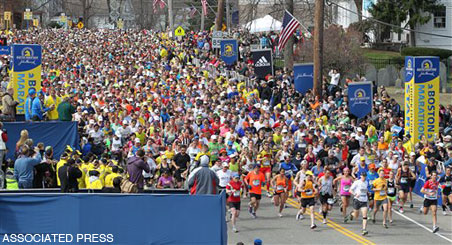Boston Marathon: A Runner’s Need to Cross the Finish Line
When the Boston Marathon was suspended Monday afternoon, 5,742 runners remained on the course, 14 of them from Philadelphia. Most of those 14 were stopped by police two-thirds of a mile from the finish, outside a tunnel on Commonwealth Avenue. You can see them rendered on the website of the Boston Athletic Association, their little avatars running in place, virtual legs churning eerily on an interactive map.
Jessica Litt, running her second Boston marathon at age 47—her 35th marathon in total—was among them. Litt, who lives in Society Hill and owns the House of Tea in Queen Village, says she arrived at the tunnel just before 3 p.m., where she saw that a couple dozen runners had stopped. Figuring someone had fallen, she tried to muscle through the crowd. When she got past them, a cop told her there’d been an explosion at the finish, and that she couldn’t go on. “At that point you can’t comprehend,” she told me. “You are four minutes away from the finish, you’re not stopping me. No.”
Her legs soon cramped up, and after 40 minutes, all 4-foot-10 of her was freezing from sweat and idleness and whatever drastic chemical imbalances a marathon produces in the human body. She thought about making a run for it, but eventually sat down, resigned. “I was running one of the best races of my life, great for Boston. It’s done. What now?” Litt continued, needing to vent. She talked about the medal “someone took away” from her, and about the terrible sensation of “being that close and being stopped.”
That Litt, or anyone else, didn’t finish the race seems of minor consequence, considering the reason for the marathon’s disruption. But her attitude is in fact rather common, and in its own way, profound.
One runner, writing for Outside magazine, waited under that same Mass. Ave overpass, itching to burst past the invisible barrier erected by police.
They let us walk under Massachusetts Avenue, but instead of turning right on Hereford, we were forced to turn left. Several of us took one look down Hereford, peeking at that last turn onto Boylston—the final stretch just out of reach.
Another, pulled off by police at mile 26.0, vowed he’d run again soon to overcome the “feeling of incompleteness.”
A reporter for Sports on Earth watched a set of stragglers fight through, ignoring the bombs detonating yards away from them.
They kept running. That was their instinct. They had made it almost the whole 26 miles and 385 yards, through Ashland and Framingham and Natick, past Wellesley and Boston College, up and down Heartbreak Hill. Now they were on Boylston Street, in Copley Square, and they could see the finish line when the world exploded. I keep watching them run. The guy in the pink shirt. The woman in the lime-green top. They might’ve been delirious. A marathon can do strange things to your mind. But somewhere in there is that desire, strong as a runner’s calf, to finish what you set out to do.
For the marathon runner, the impulse–the need, really–to finish the race, takes on near-pathological importance. In no other sporting event is the act of completion the most meaningful one. The vast majority of participants aren’t competing with anyone. They are not receiving prize money. Men race with women; the able-bodied run alongside the handicapped.
Choosing to attack the finish line of the Boston Marathon was not only a strategic decision, but a symbolic one. What made the bombings especially cruel–terrorizing the place where we gathered to watch ordinary humans accomplish an extraordinary thing–also helps explain the emptiness one might feel, stranded, minutes before the finish, knowing that tomorrow you’d be back selling tea in Queen Village.



